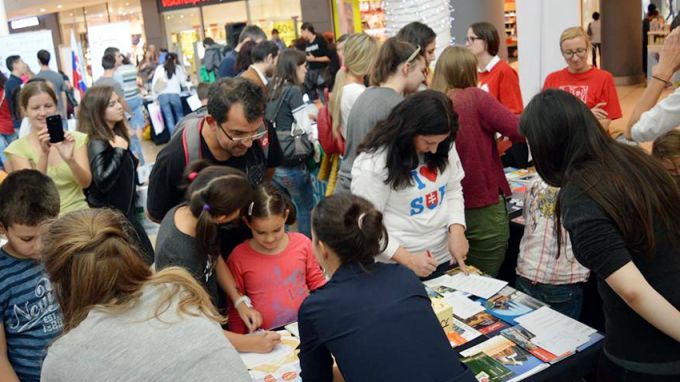
Sofia has been a city at the crossroads since ancient times and various languages and cultures meet here. Today the Bulgarian capital is even more colourful. It is enough to take a day for a walk in the historic centre of the city or in one of the largest shopping centres to hear a variety of languages.
In the city streets one can often hear conversations in English, Russian, Spanish, Italian, but if you listen to the speech of foreigners in some of the cafes in Pirotska Street for example, you would hear Greek, Turkish, and often Arabic.
Language is not just a tool of communication; it is the most direct way to explore a distant culture, its traditions, customs, manners and history. That is why in each of the countries that are members of the Council of Europe, a day dedicated to languages is organised. Its aim is encouraging children and adults to study foreign languages.
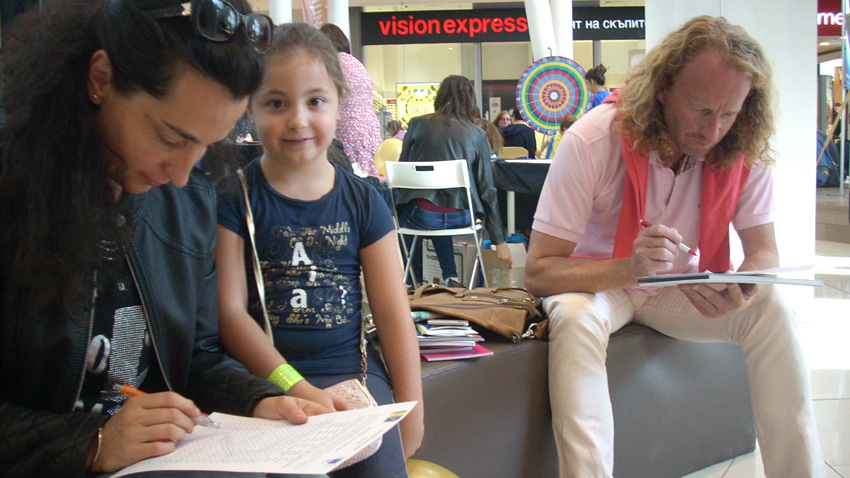
In the first sunny day of October, a number of citizens gathered to check their knowledge and to meet teachers who could assist them in learning a foreign language. The stands that presented 19 European languages attracted a great number of people, eager to participate in quizzes and games.
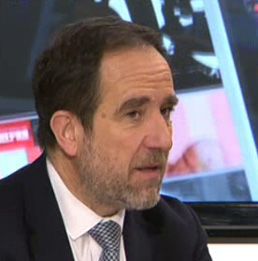 The advice to the students of Spanish from the head of the Cervantes Institute in Sofia, Javier Valdivielso, is listening to good music and watching Spanish movies and TV series, which could help in learning the language fast.
The advice to the students of Spanish from the head of the Cervantes Institute in Sofia, Javier Valdivielso, is listening to good music and watching Spanish movies and TV series, which could help in learning the language fast.
"The EU currently relies on the principle that people should speak many languages, not just one. Of course English is the international language of communication, but English is not enough. When studying a second foreign language Spanish is very suitable because it is the second most popular language. Bulgarians actually easily learn foreign languages. I speak Spanish, Basque, French, Italian and English, and now I am trying to learn Bulgarian, too."
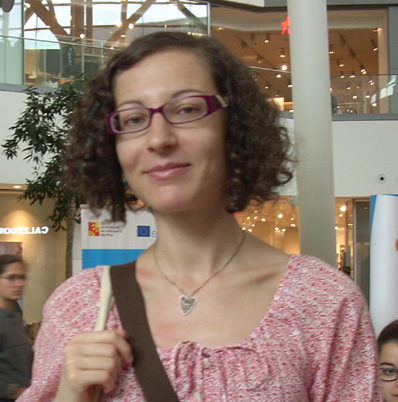 Rositza Tzvetanova is interpreter and lecturer of Scandinavian Studies. Her favourite foreign language is Swedish, although Bulgarians have difficulties with its phonetics.
Rositza Tzvetanova is interpreter and lecturer of Scandinavian Studies. Her favourite foreign language is Swedish, although Bulgarians have difficulties with its phonetics.
"Actually this is a very nice language and the grammar is easier in comparison to German. Languages are keys to explore foreign countries. Swedish is an important and exciting language, because it is the language of Astrid Lindgren, ABBA and of popular music.”
At the stand of Slovakia we met Ambassador of the Slovak Republic to Sofia, Marián Jakubócy. He has been in Bulgaria for 3 years and speaks fluent Bulgarian. He says he likes listening to Bulgarian radio channels and reading in Bulgarian. He adds that some 7-8 million people speak Slovak but speakers of the language easily understand also Czech, Polish, Russian and Ukrainian.
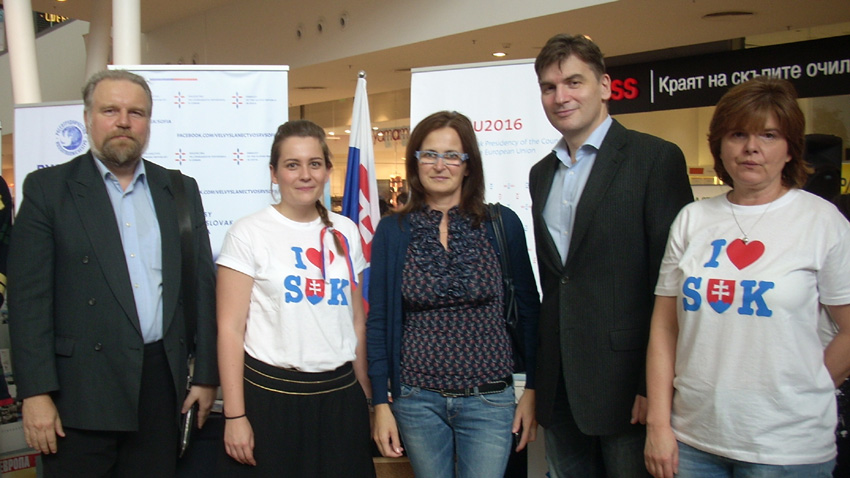
Assoc. Prof. Velichko Panayotov is a teacher and says that there are already many books and dictionaries in Slovak in Bulgaria.
"There are some contradictions when one starts to study Slovak language, because there are many words similar to Bulgarian, but there are also some words that sound the same but have different meaning. For example ‘divak’ in Slovak means ‘viewer’, while in Bulgarian the same word means ‘savage’.”
The motto of the Institute of Bulgarian Language in Sofia is “written words remains, be literate". The Bulgarian stand attracted the biggest number of people, who wanted to show that they know and respect their language. Maria Todorova from the institute told us why is it important to have excellent spelling and grammar:
"It is very important to write properly. Good literacy is a matter of prestige and self-respect. We participate in the forum with entertaining games. Some are aimed at children and are related to knowledge of synonyms and letters. There are games focusing on adults, too. Good knowledge of a language requires efforts, desire and perseverance."
English: Alexander Markov
Bulgarians across the country are welcoming the New Year with various initiatives. More than 20 members of the club of karate and yoga coach Emil Zlatev in Varna traditionally swam in the sea on January 1. They say that they never..
The President of the Republic of Bulgaria Rumen Radev has congratulated all Bulgarians at home and around the world on the arrival of the New Year 2025 and wished them peace, health and prosperity. "The world is sending off a year..
Traditionally, the citizens of Sofia and guests to the capital can welcome the New Year 2025 together at the central Knyaz Alexander I Battenberg Square. The celebration today, December 31, begins at 21.30. Some of the most popular Bulgarian pop and..
On the night of 19-20 January - the celebration of Yordanovden (Epiphany) and Ivanovden (St. John's Day) in the Julian calendar - the northwestern town of..
Interest in the exhibitions and events at the Regional History Museum in Ruse on the Danube is growing. In the last 12 months, it had 95 966 visitors,..
From the first attempts to fly with homemade wings back in the 19th century, to the world's first combat flights with reconnaissance and bombing..

+359 2 9336 661
